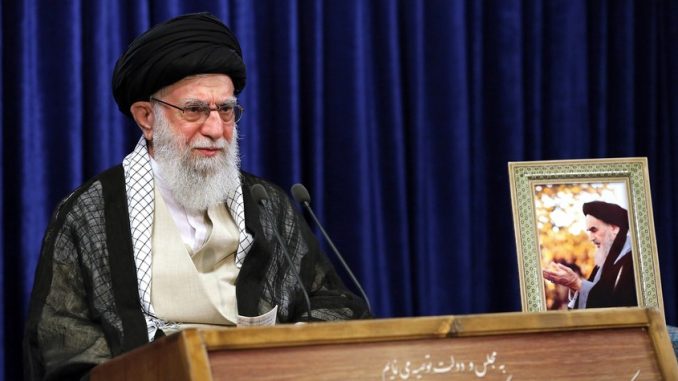
President Trump quit the Iran Nuclear Deal back in 2018 but President Biden promised he would try to negotiate a US re-entry to the deal. But today the NY Times reports the Biden administration has gone from hopeful to pessimistic amid signs it may be too late to restore the deal.
Days before a new hard-line president is set to be inaugurated in Iran, Biden administration officials have turned sharply pessimistic about their chances of quickly restoring the nuclear deal that President Donald J. Trump dismantled, fearing that the new government in Tehran is speeding ahead on nuclear research and production and preparing new demands for the United States…
“There’s a real risk here that they come back with unrealistic demands about what they can achieve in these talks,” Robert Malley, the lead American negotiator, said in an interview.
President Ebrahim Raisi is a former judge who had a notable role in the execution of thousands of the regime’s prisoners back in the 1980s. The Times reported yesterday that there’s a murder trial starting next month in Sweden which involves one of the regime’s many victims:
A Swedish court will prosecute a former Iranian judiciary official for war crimes and murder in connection with Mr. Bazargan’s death. The case carries some notably public and damaging implications for Iran’s president-elect, Ebrahim Raisi, who helped decide which prisoners lived or died during those mass executions…
Mr. Raisi, 60, was a member of the four-person committee that interrogated prisoners and issued execution orders. Mr. Raisi has said he was acting under the direction of the founding father of the revolution, Ayatollah Ruhollah Khomeini, who had ordered a committee be formed to facilitate the executions.
Allegations of Mr. Raisi’s work on that committee have shadowed him through his ascent in Iran’s hierarchy, where he had been the head of the judiciary before the June election that vaulted him to the presidency. Amnesty International has called for a formal investigation of Mr. Raisi’s past.
All that to say, Raisi has sent a lot of Iran’s own people to the gallows so expecting him to play a diplomatic game with “the Great Satan” is probably going to lead to disappointment. Already, the regime is demanding at least one thing that the US can’t offer.
The new president will not be the final word on whether the deal is restored. That judgment still belongs to Iran’s supreme leader, Ayatollah Ali Khamenei, who is believed to have lined up the support for Mr. Raisi’s election. And on Wednesday, the ayatollah echoed a key demand: that the United States provide a guarantee that it can never again walk away from the pact the way Mr. Trump did.
“They once violated the nuclear deal at no cost by exiting it,” Ayatollah Khamenei said. “Now they explicitly say that they cannot give guarantees that it would not happen again.”
Sec. of State Blinken has correctly pointed out that no US president can limit the ability of a future US president to take a different approach. Democracy works differently than theocracy. But in Iran’s view, there’s no point in reentering the deal if they can’t get the financial benefit of lifted sanctions. And they figure as long as there’s a chance the US could reimpose sanctions again in the near future, no one is going to be willing to invest in Iran.
Meanwhile, Iran keeps spinning those centrifuges and the country has barred inspectors from entering its Natanz underground facility. Iran says that won’t change until a deal is reached. So, for the moment, they probably are enriching uranium for a bomb that we don’t know about.
Yesterday, Germany, which is still part of the agreement warned that the time for Iran to act is running short:
“I am seeing with growing unease that Iran is delaying the resumption of the Vienna nuclear talks on the one hand, and on the other hand it is simultaneously moving further and further away from core elements of the agreement,” news weekly Der Spiegel quoted German Foreign Minister Heiko Maas as saying…
“We want a return to the JCPOA and are firmly convinced that it is in all sides’ interest,” Maas said. “But it is also clear that this option will not be open to us forever.”
It’s starting to look as if Iran is no longer interested. Maybe they’ve decided that a run for the bomb is their best bet for the regime’s continued survival.
Iran has repeatedly claimed that a nuclear bomb would be against their deeply held religious views. “It is us who, because of our religious views, will never pursue a nuclear weapon,” Foreign Minister Javad Zarif said in 2019. But like a lot of things the regime says, no one believed it for a moment.
